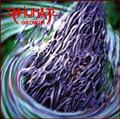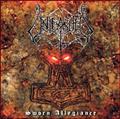DERIVATE (ch) - Derivate (2015)

Label : Auto-Production
Sortie du Scud : 5 janvier 2015
Pays : Suisse
Genre : Metal Progressif
Type : EP
Playtime : 5 Titres - 30 Mins
DERIVATE est la nouvelle formation du groupe Punk Hardcore suisse SIGNS OF MISFORTUNE. Le split accompagne une transition musicale vers le Metal Progressif. A part çà rien ne change. Le line-up reste le même.
L'intention peut-être louable mais faut pas avoir peur de paumer son public dans l'opération !
DERIVATE expérimente une technique de composition itérative. Je pars d'un riff, je l'écoute, je l'intériorise, je sors une idée et je repars sur cette nouvelle idée pour avancer... entre cadavre exquis, écriture automatique et association d'idées.
Le groupe décrit le résultat obtenu comme : "Un EP de 30 minutes oscillant entre un Rock groovy opethien et des assauts de Metal moderne où la double pédale et les guitares saturées et nerveuses vous arrivent en pleine poire." Ambitieux, non ?
L'idée force de DERIVATE, c'est la répétition. La méthode itérative utilisée pour la composition a donné des résultats... itératif. On peut même parler de duplication !
En effet, exception faite de la dernière, toutes les pistes de la tracklist comprennent : une ouverture en chant clair avec des sonorité Nu Metal, une accélération et durcissement au milieu du morceau avec double pédale et chant hurlé, une longue outro de clôture à la guitare seule dans un genre ballade mélodique.
Les parties en chant clair sont les plus cohérentes et plutôt agréables tant dans l'orchestration que dans la compo. Le problème, c'est cette transition forcée vers un Speed Metal hurlé qui casse la dynamique plutôt sympa de la première partie. Le growl est dissonant, la double pédale est trop mise en avant et les trop nombreux soli de guitare mélodique arrivent là-dessus comme un cheveu sur la soupe.
Paradoxalement (ou pas, c'est peut-être voulu), la seule piste qui sorte du lot est la dernière, "Mouvement 5: Cycle". Elle ne respecte pas la structure sérielle, ne joue pas sur un contraste de chant ou de forme et ne propose pas d'outro. C'est un long morceau plutôt réussi qui lorgne du côté du Speed Metal ou d'un Thrash à la SLAYER.
La créativité n'a de sens que si elle est au service du résultat. Si le combo cherche à se redéfinir et à changer de direction artistique, il nous donne ici un aperçu de tous les styles sur lesquels il pourrait s'exprimer. Cet EP est le travail d'un groupe qui maîtrise techniquement sa musique, mais dont la recherche d'une construction originale se fait au détriment de toute cohérence et même d'un petit supplément d'âme.
Ajouté : Jeudi 08 Janvier 2015
Chroniqueur : Rivax
Score :  
Lien en relation: Derivate Website
Hits: 8448
|














